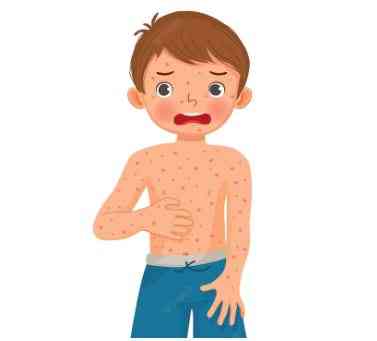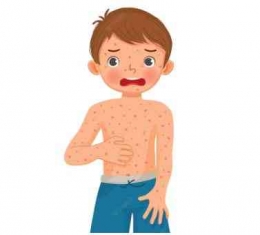12 provinces in Indonesia declared an "extraordinary occurrence" of Measles. As of January 2022, 12 provinces in Indonesia have reported an increase in measles cases. Measles is a highly contagious disease, and the most effective way to prevent it is with immunization. Measles is transmitted from person to person by respiratory droplets, small particle aerosols, and close contact. Measles is an acute febrile exanthem that is characterized by the three "Cs": cough, coryza, and conjunctivitis. The incubation period is 10 to 14 days although longer periods have been reported.
The government attributed the rising infections to decrease of measles immunization coverage amid the Covid-19 pandemic. If children have received immunization their body will be better able to deal with and defeat measles virus-infection. According to IDAI's Childhood Immunization schedule, measles Vaccine/ MMR first dose is given between 12- 15 months of age and second dose is given 4-6 years of age.
The measles virus can lead to a variety of complications, in children and also in pregnant women. Common complications are ear infections and diarrhea. Serious complications include pneumonia and encephalitis. Long term complication is subacute sclerosing panencephalitis (SSPE). Measles may cause unvaccinated pregnant women at risk of experiencing a miscarriage, give birth prematurely, / have a low-birth-weight baby. It has been recently discovered that the measles virus can cause "immune amnesia".
Measles virus damages pre-existing immunological memory, destroying B lymphocytes and reducing the diversity of non-specific B cells of the infected host. In particular, this implies that previously acquired immunization from vaccination or direct exposition to other pathogens could be partially erased, whose effects can become particularly worrisome.
Measles is commonly diagnosed clinically based on signs and symptoms, especially when evaluating children with febrile illness and a maculopapular rash. Blood routine examination may show leukopenia, particularly lymphopenia, and thrombocytopenia. Electrolyte imbalance may be found in children with poor intake / have diarrhea. To confirm the diagnosis can be identification of measles-virus-specific IgM antibodies in serum or plasma.
These antibodies usually peak within 1 to 3 weeks after the onset of a rash and become undetectable by 4 to 8 weeks. In current clinical practice, we perform molecular testing such as polymerase chain reaction (PCR) to look for the measles virus from a sample of throat, nasal, nasopharyngeal, and urine sample, with sensitivity approaching 100%.
There is no specific antiviral therapy for measles, treatment is primarily supportive. Control of symptoms and correction of dehydration/ electrolyte imbalance, and infection control measures including appropriate isolation form the mainstay of therapy. Clinicians should identify measles complications early and appropriate therapy initiated.
Measles is a preventable infection with vaccination. Parents need to realize and be informed that the MMR vaccination is important for their children and the adverse effects of the measles vaccination are rare and minor, without vaccination, there is a high risk of transmitting the infection to others and can cause serious complications. Don't let Measles into your child's world. Let's get vaccinated!
Baca konten-konten menarik Kompasiana langsung dari smartphone kamu. Follow channel WhatsApp Kompasiana sekarang di sini: https://whatsapp.com/channel/0029VaYjYaL4Spk7WflFYJ2H








